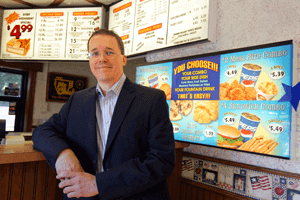The other day I heard a compliment from a customer who returned to Cleveland after seven years. She took a bite of chicken, smiled and said, “Oh, my God, it tastes exactly the same.”
The coleslaw you buy today at Mr. Chicken is exactly the same recipe as back in 1968 when my father, Robert, started Mr. Chicken — hand-chopped every morning so it’s fresh. Our chicken is the highest-quality farm-raised product we can buy. It’s hand-breaded and cooked fresh all day, so you get the same great Mr. Chicken taste every time you visit one of our 11 stores.
You can’t be in business for 40 years without having a formula with systems in place. But when you’re in business for a long time, you can get bored. It’s not broken, but you start tinkering because you want to stay fresh.
With all of the major issues in business we’ve faced, there is one recurring theme: We get distracted or thrown off our game by the competition.
Our biggest mistake was forgetting that we have a base of hometown customers who love the chicken. We tended to get restless and try new foods, new locations and new marketing that only got us off track.
It took us a while to learn that we’ve done our job if we can match someone’s fond memory of our food. When Boston Market entered the market, we added meatloaf and turkey to the menu at some of our stores. It lasted only a few months. I remember one of my friends saying, “What are you doing? You’re not Mr. Meatloaf. You’re Mr. Chicken.”
Competition is always on your mind. Competition is good. It’s the reason we’re in business. After the Korean War, my father worked as a general contractor for 17 years. He used to build KFC restaurants. At one point construction was slow and he thought that going into the restaurant business was a better way to feed his four kids.
But you’ve got to find your niche. We’ve tried to incorporate in our menu the tastes that Clevelanders enjoy. Throughout the years we added greens, okra, red beans and rice, sweet potatoes and chicken gumbo because of customer requests. We try to reproduce recipes that our employees’ grandmothers make.
Listening to our customers works for us. Reacting to new competition does not, like when we added chicken tacos and riblets to our menu.
It’s natural to want to expand in different ways, from locations to marketing.
We expanded to Youngstown in the early ’70s and remained in that market with four locations until 1998. We stayed there far longer than we should have. Just because you’re a hometown favorite doesn’t mean you can go to someone else’s hometown and be their favorite. You try to adjust, with new products and marketing, but it’s a drain on resources. Youngstown was not our future. By being there, we were taking our focus off Greater Cleveland.
We’ve veered off course with marketing, too. For decades we reached customers through radio and print advertisements. But it’s tempting to try to be bigger than you are. You see the national TV commercials and you get envious.
We launched our first TV commercial in 2000. We produced a few before I realized we had to go back to what worked for us. There are good food commercials that generally cost about a quarter of a million dollars, and there are bad ones. That’s it.
If you can’t compete with huge national food companies, you shouldn’t even be in the ring. One 30-second commercial produced by a national company cost more than our entire marketing budget for the year.
In the past 10 years we’ve realized who we are to the community. What can I say — I’m a slow learner. Our customers look at our restaurants and the chicken they bring home to their family as comfort food, something that should remain constant.
I had to realize customers like us for a reason, just like the pair of broken-in slippers you love to put on when you get home from a hard day at work.
Our challenge is to move forward as a company while always keeping in mind our customers’ desires that we never change.

